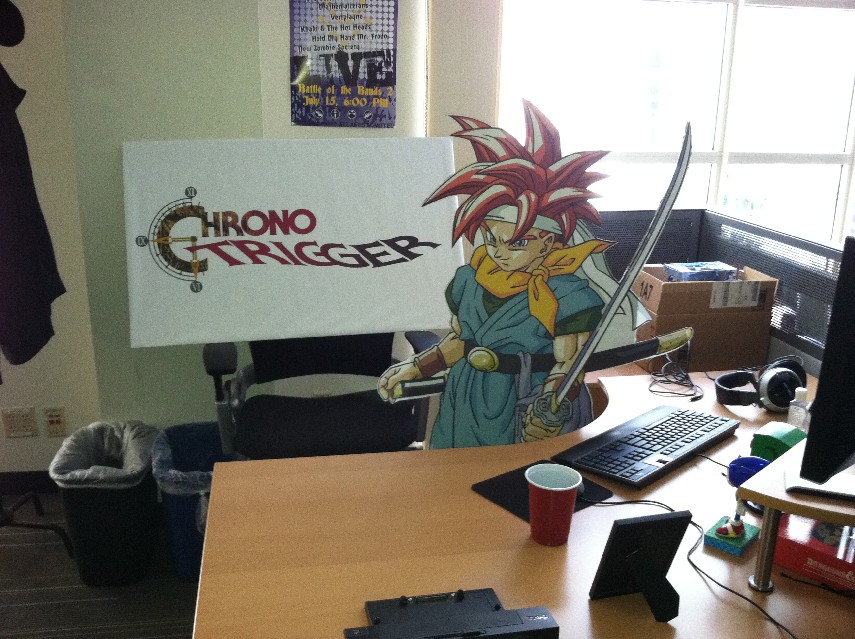Tweet
Game designers: If your game ever says “Unsaved data will be lost” you are doing it wrong. ESPECIALLY if there is no explicit save system.
Welcome to Pixel Poppers; my website for talking about games. The newest posts are below; you can also check out the about page if you’re new here, search the site, or grab the feed.
Game designers: If your game ever says “Unsaved data will be lost” you are doing it wrong. ESPECIALLY if there is no explicit save system.
Too often lately: Beat awesome game. Feel good about game. Play more. Give up in disgust on poorly-designed trophies. Feel bad about game.
#Enslaved is the dictionary definition of a Bad Good Game. I’m totally in love with it - I just wish it would stop sucking so much.
I just reinstalled #cityofheroes since it’s free to play now. My level-cap main has been offline for sixteen hundred days.
When Crono sleeps in, he’s late for the Millennial Fair. When I sleep in, Crono steals my job. 
GameStop Underling: Huh. That’s interesting.
GameStop Boss: What is?
Underling: These Deus Ex: Human Revolution games Square Enix shipped us include a voucher for a free OnLive copy of the game. I don’t think they mentioned they were gonna do that.
Boss: What? OnLive? But we just bought our own digital delivery game service - Impulse! That makes OnLive our competitor!
Underling: I suppose it does.
Boss: We better open the boxes and remove the vouchers.
Underling: Wait, what?
Read more...Judging videogames by length is like judging meals by weight.
In western RPGs, you kill Satan (malevolent power-hungry beast). In JRPGs, you kill God (incomprehensible timeless superbeing).
Recently we discussed Blizzard’s announcement that they are saddling Diablo III with terrible DRM, which they say isn’t DRM, but which everyone knows is DRM. I mentioned that there was much to be said about the contemporaneous announcements of a real-money auction house and a ban on modding. Well, the time for that is now.
Read more...You may have heard that there’s been a bit of a kerfuffle recently in response to some news about Diablo III. I’ll walk you through it - but first, we need to talk about Ubisoft.
On July 28, Ubisoft reported that they consider their constant connection DRM scheme to be a “success.” This despite the uproar and backlash caused by the scheme, the fact that it was immediately cracked, the clear demonstration of the system’s flaws when denial of service attacks locked out paying customers and left pirates unaffected, and Ubisoft’s eventual scaling back of the DRM to a once-per-run validation. Their reasoning?
Read more...Seems we don’t buy games anymore but passes to theme parks that can close at any time with no warning, whether it be for one day or forever.
I still can’t quite believe that the Robot Unicorn Attack song is not a parody, but a legit Erasure song from 1994.
Iceman says when he was a lad, ARGs were called “scavenger hunts.” Also that the Potato Sack thing is like being in a guild in a metagame.
Part One is here.
Anonymous said…
Post an update….what do you think of the replies you’ve got here?
Okay. You’re on.
Read more...I’d like to see a compelling single-player experience where the player character is a healer.
This has bugged me for a while - why is there no Pokemon MMO? I can’t think of a single franchise more perfectly suited to the format.
Dear Assassin’s Creed Brotherhood: Stop putting big juicy inviting map icons on places the plot won’t let me go yet. Your pal, @doc_prof.
I quit World of Warcraft in June of 2009. I quit hard. I donated my assets to the guild bank and deleted all of my characters. I didn’t want to leave the door open to come back. I wanted to burn it down and salt the earth.
Why? Well, that’s a bit complicated.
Read more...This fan-made Assassin’s Creed music video is beautifully done:
I don’t have much more to say about Uncharted 2, as it turns out, because I didn’t get through much more of it before giving up and sending it back to GameFly. I’m therefore not qualified to review it, but I’ll tell you that the reason I sent it back was because I disliked (a) the combat (b) the parkour (c) the artifact-hunting, which leaves very very little to enjoy. All that remains is the game’s cinematic components, the dialog and characterization and set-pieces. And there’s the other problem: Uncharted 2 is, even more than its predecessor, far too movie-like.
Read more...